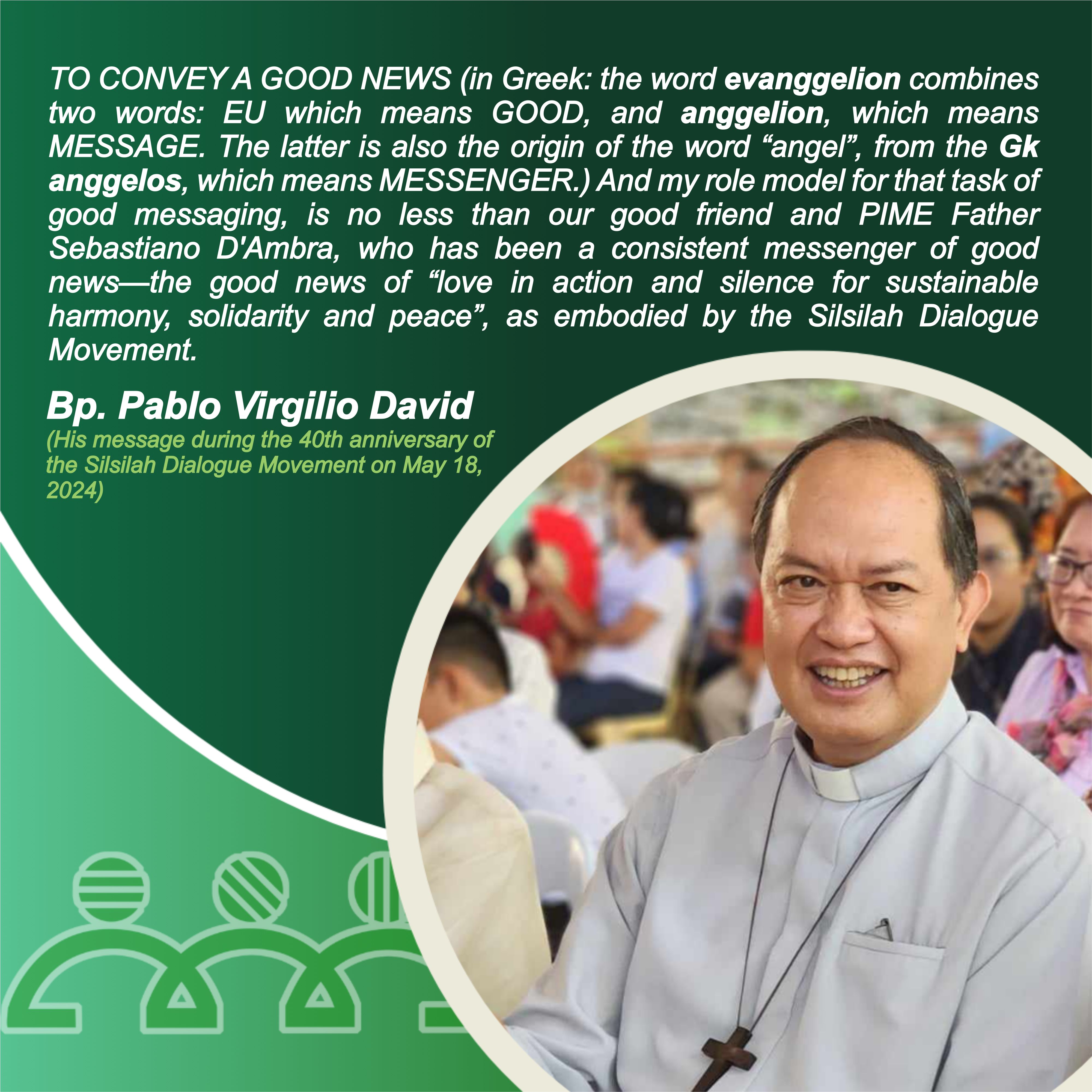Cardinal Pablo Virgilio David: A new hope for the mission of Interreligious Dialogue
We in Silsilah Dialogue Movement are happy that Bishop Ambo David, the president of the Catholic Bishops’ Conference of the Philippines (CBCP) has been elected cardinal. The long friendship of Fr. Sebastiano D’Ambra, PIME, founder of the Silsilah Dialogue Movement, and Cardinal-elect David began a few years back when a common friend, Marilou Diaz Abaya, a famous film director became a member of Silsilah. She also inspired Cardinal-elect David to use the media for evangelization.
On May 18, 2024, His eminence was in Zamboanga City to celebrate the 40th anniversary of Silsilah. On that occasion, he shared to us this message:
On this happy occasion of the 40th Anniversary of Silsilah, I’m here to represent not only the CBCP as president but also the FABC as its incoming VP. I do not know if you are aware of our vision in the FABC of a Church that engages in “evangelization” through a triple dialogue (with religions, cultures and the poor). One of the most committed advocates of what we call triple dialogue is our former CBCP president, and former Archbishop of Davao, the Most Reverend Fernando Capalla, who passed on to the great beyond early this year 2024, in January. This great man, of happy memory, who is a good friend of many of you, is now fondly remembered as one of the founders of the Bishops-Ulama Conference.
I mentioned the word “evangelization” and I know that it is a word that is overloaded with a lot of historical connotations that are not always pleasant to talk about. I also know of intellectuals who tell me frankly that the term inevitably conjures up many historical traumas, including colonialism and proselytism. I was once denied a visa to India because I presented an invitation to a conference entitled “A Call to New Evangelization.” The man at the Consulate did not mince words when he asked me straightforwardly, “You want to enter India in order to convert more of our Hindu people to your Christian religion in order to save their souls, right?” I was too shocked to even say “No, sir.” He didn’t sound like he was asking a question but making a very sarcastic statement. He ended up by pushing back my application papers and saying, “Sorry, evangelists like you are not welcome to India.” Visa application denied.
The only way to avoid the bad taste that comes with the word evangelization is to return to its literal meaning—which is TO CONVEY A GOOD NEWS (in Greek: the word evanggelion combines two words: EU which means GOOD, and anggelion, which means MESSAGE. The latter is also the origin of the word “angel”, from the Gk anggelos, which means MESSENGER.) And my role model for that task of good messaging, is no less than our good friend and PIME Father Sebastiano D’Ambra, who has been a consistent messenger of good news—the good news of “love in action and silence for sustainable harmony, solidarity and peace”, as embodied by the Silsilah Dialogue Movement.
Fr Seb reminds me of another good friend, in fact a common friend of ours—the late world-class film director, Marilou Diaz Abaya. Direk Marilou, as we fondly called her, taught me that the best way to convey a good news is through good storytelling. She also taught me that there is no story worth telling except a story of redemption, one that brings out everything in us that is true, good and beautiful, one that leads our often tragic stories to a happy ending. She once coined the motto “I believe in happy endings; if the story is not happy, then it’s not yet the end. It must continue to be told until it reaches its happy ending.”
We’re gathered together here today, I believe, for that common universal endeavor—to aim for a happy ending to all our particular stories. Direk Marilou also believed that what is most particular is also that which makes our stories most universal. And by that she is referring to the simultaneously particular and universal character of our experiences of love, compassion, generosity and self-giving—which are inseparable from our common expressions of faith, spirituality. They are also the most palpable stirrings of our shared humanity towards that which uplifts our dignity. These stirrings are most evident in our openness to aim, not just for our individual good, but also for our common good and for the integrity and sustainability of the earth, our common home.
At our FABC 50 conference, Cardinal Luis Antonio Tagle pointed out that dialogue is often understood as just bilateral, meaning a dynamic between two sides. He posed the challenge to explore new ways of engaging in dialogue that are multilateral, what we might call a”multilogue” or the kind that requires precisely the spirit of synodality, which is Pope Francis’s most unique way of advocating for a universal fraternity and solidarity, and is giving modern-day Catholic Christianity its freshest character. He spoke of the necessity for us to take more seriously the spirituality, lifestyle and living out of dialogue/multilogue in our local communities, ad intra, among ourselves, and ad extra, in relation to the varied societies in Asia, in which we operate.
Let me end now by congratulating all of you for taking time to be here today to celebrate the 40th anniversary of the Silsilah Dialogue Movement, on this significant day of the eve of the conclusion of the Easter Season for Catholic Christianity, through the feast we call Pentecost. May the blessing of Pentecost, which reversed the curse of Babel, allow us to experience in this celebration a genuine encounter that will transform our tongues of flesh into tongues of fire and empower us all to become effective advocates of harmony, solidarity and peace. Thank you.

